Namakula is a multi-talented actress, voice-over artist, creator and producer based in New York. She’s basically a kick-ass at everything she does.
Her work includes commercials, theatre, web series, TV series, and in the past, stand-up comedy.
She’s landed roles on The Late Night Show with Conan O’Brien, New Amsterdam, The Blacklist and Netflix’s Inventing Anna, to name a handful.
We sat down to ask her about her journey into the industry and what she values most about her work.
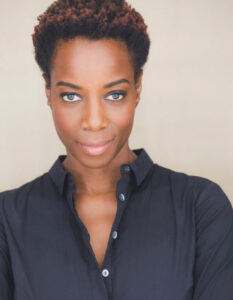
1. When did you know you wanted to be in the film industry?
As a kid, I always wrote, created characters and played guitar and piano. I knew I wanted to be a performer. I used to say I wanted to be an actress, musician and writer. There was nothing else that I gravitated towards.
2. Were you exposed to the industry at a young age?
I didn’t grow up in a household of artists. I’m a first-generation American raised by a Ugandan academic father and a strong Jamaican mother. Many years later, my dad recounted that he’d performed in school plays and loved John Wayne movies as a child.
My dad said he’d wanted to be a cowboy when he was younger because he didn’t know what being an actor meant. For him, growing up in a prominent family in Uganda, the career options were doctor, teacher or something similar.
My dad went on to become an accomplished professor. He was a visionary and always supported my creative dreams.
When I’d watch films and TV shows, a voice in my head would say, “I can do that”. I could see myself in unconventional characters even though they often didn’t look like me.
That’s why I created characters for myself and others that didn’t fit into the boxes the system had been pushing.
I wasn’t being considered for the multi-layered roles that I found compelling. But, nowadays, the casting of these complex characters transcends what was previously considered ‘the standard’.
Many voices and perspectives are achieving and creating opportunities to stand out.
3. Did anything scare you about the industry?
In hindsight, I was never scared as things seemed to fall into place for me. I followed my instincts.
I credit this to my angels and mentors who helped me along the way. I did have moments wondering how this artist’s life would unfold and if I would ultimately be happy and feel fulfilled.
4. How did you break into the industry?
I went to New York University Tisch School of the Arts to study acting.
While there, I didn’t want the label of ‘actress’. I never felt like I fit into that characterisation because of my other creative passions such as: writing, editing and producing.
While studying in college, I worked as a hotel concierge. I was aiming to get a summer internship with a production company – but I wasn’t having any luck.
I asked a co-worker if she knew anyone in film production. It just so happened she had a friend who owned a commercial editorial shop in Soho, New York City.
I took up a summer internship there and learned about a new industry I knew nothing about: advertising. I loved learning about the industry’s creative, technical and interpersonal aspects.
When I finished college, they offered me a staff apprentice position. I knew I didn’t want to be an actor waiting tables. If I wouldn’t be earning a living doing my craft, I wanted to be in an environment where I would be learning other areas of the business: developing myself, my resilience and understanding the business side of things.
Some people couldn’t understand why I would miss out on building my career as a 20-something aspiring actor. But I was OK putting acting on the back burner to learn about what goes on behind the camera.
5. How was your experience of working behind the camera?
I worked with top talents in advertising – directors, copywriters, producers, etc. I learned about storytelling, casting, the approval process and how decisions were made.
I trained under and worked alongside super-talented editors. Some of them went on to win Academy Awards on incredible projects. I worked throughout the US and Europe. I did this for 15 years, working my way up to a video editor position.
During this time, I continued to act and perform. I wrote spec comedy scripts, honed my voice-over skills and performed stand-up comedy.
After over a decade in editorial, I reached a point where I wanted to pursue acting full-time.
Learning about the business gave me a different perspective than if I had left college and started acting straight away. Not to mention, it was the fortification I needed to approach a profession fraught with rejection.
If I hadn’t taken this path, I wouldn’t have all this information to understand how the process works, how to prepare for an audition and how not to take things personally when you don’t book an acting job. There are many factors at play in how decisions are made.
I’m grateful for my journey because it paved the way for where I now have both the on-camera and behind-the-camera skills.
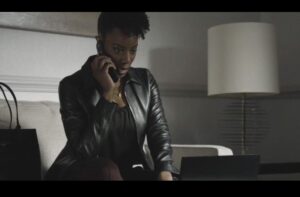
Namakula featuring in The Blacklist thriller series.
6. Was it hard to balance all those different areas?
Funnily enough, at the beginning of my career, the owner of one of the editing houses where I worked in suggested that I just focus on editing. He alluded that being involved in many other things (such as writing, acting, etc.) could be a hindrance.
But I knew that the other things I was doing were strengthening my creative and editorial skills.
Back then, it was almost frowned upon to be doing so many different things. Now, you’re expected to be multi-faceted. Again, I followed my instincts. And so far, it continues to pay off.
7. When you focused on pursuing acting, did you experience frustrations?
At times, things wouldn’t work out as quickly as I’d hoped.
I’d have years where I’d be on a roll, and then it felt like my career was stagnant. Instead of beating my head against a wall, I’d explore other creative outlets.
Some years back, I experienced a block in my acting. At the time, some musician friends asked me to play bass in their new band. I had never played bass, only guitar, and had to learn. Shortly after, we were gigging in music clubs throughout New York City, playing and composing original songs.
This proved to be a valuable experience to use in my acting work to enhance my rhythmic timing and pacing, which informed my performing and voice acting.
If something isn’t flowing, step away. Go try other things that may trigger a solution to what is causing you to be blocked or can inspire you in new ways. There’s always a reason why things work out as they do.
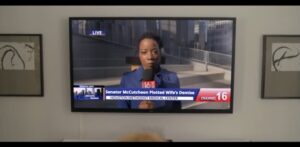
Namakula featuring in Netflix’s The Politician, a satire comedy that stars Gwyneth Paltrow and Bette Midler.
8. Does acting get very competitive?
It can be. Actors are conditioned to look at each other as competition. Because of that, it’s hard to connect with other actors in a casting waiting room.
But I did meet one of my closest friends at a commercial audition. I’d recently left my editing career and was going door to door to casting offices as a commercial actor. We’d been paired up at an audition for a yoghurt commercial as girlfriends dishing over brunch.
I approached her afterwards and asked her what she thought of my outfit. We started chatting and have been friends ever since. That was over 15 years ago.
Years later, she told me she was surprised I’d asked for her opinion after the audition. Actors often see each other as rivals. They don’t want to show each other vulnerability.
If a role is meant to be yours, it will be. All you can do is your best by being prepared, auditioning with gusto and glee – and leaving it in the room. If you don’t book the role, it wasn’t meant for you.
9. What have been some of your best and worst experiences in the industry?
I haven’t had bad experiences. Even if something wasn’t what I thought it would be, it was a learning experience.
One of my best moments was working with one of the top commercial directors early in my career. He was known for being tough and a bit crazy.
But when I got to set, I had a completely different experience. He was warm and respectful. He made me feel like he trusted me and knew I was the one for this part.
It was a big affirmation to have someone of that stature in the industry believe in you to perform for their multi-million dollar client.
After filming, he requested me for another project – which for him, was unheard of. The casting director was even asking who I was, as it was rare for this director to invite actors back. You don’t always get that in the industry, so it’s nice when it happens.
It was an experience that let me know people had faith in my work.

Namakula in a Dunkin’ Donuts advert.
1o. The film She Said, based on the New York Times investigation that exposed Harvey Weinstein’s abuse in the industry, will be released in UK cinemas this week. How did you feel when his story and the #MeToo movement broke out?
Those Harvey Weinstein experiences seem to happen when dealing with the Hollywood machine. That’s not to say these egregious attacks don’t happen in other parts of this business or in other industries.
But in that scene, many people clamber to be a part of that world when they don’t know anything about the industry and what red flags to look out for.
Luckily, my professional background gave me a good foundation and radar of what’s legitimate and who can be trusted.
I set a standard for myself of how I like to work, who I want to work with, and how I want to be treated.
Make it your mission to surround yourself with professional, ethical and kind people.
11. What might surprise people about your industry?
People view it as just a glamorous trade. It can be. But there’s a lot of work involved.
I was hanging out with a friend who doesn’t work in the industry. She commented I was lucky to have booked a part in the Netflix series Inventing Anna opposite the leading actress Julia Garner.
I laughed because she had no idea how many auditions I had gone through.
The casting office had auditioned me for other shows, and I’d developed a relationship with them over time.
They knew and trusted me, so they kept bringing me in to read for roles. Booking a role has many layers. Getting seen is one layer.
Managers, agents, writers and casting agents are involved in getting you in the mix. Then there are many other layers of approval before you’re green-lit.
There’s the director’s and the network’s approval and dozens of people along the chain who also decide whether you’re right for the role.
And now more than ever, you also have to produce self-tape auditions, which take time and effort just to be considered.
Many people don’t think about those things, especially with the influx of reality shows. There’s often a false equivalence that ‘scripted acting’ and ‘reality acting’ are similar; they’re not. Acting is a craft. It shows in the performance of those actors who take the work seriously.
12. What does success look like for you in your career?
For me, it’s creating work that’s inspiring and meaningful. Whether through my performance, writing or voice. I want to affect people emotionally and collaborate with artists I’m aligned with.
I’ve been part of a voice-over poetry narration collaboration, The Feisty Beast.
This medium allows me to create characters and paint a picture with my voice. You’re engaging people’s imagination because they don’t have a visual. They’re going by your voice and the world you’re creating for them. They’re hearing you but adding their imagination to be part of that creation. It’s powerful.
I also want to create long-lasting work. Projects you can look back on and say this is what I created at this point in my life. Work that people connect with.
I remember shortly after my dad passed away, a commercial that always made my mum laugh came on TV. It was a big deal to have that moment of laughter with my mum when we were going through a difficult time.
Soon after, I ran into the woman in the commercial at an audition. I told her what her work did for my mother that day.
You never know how your performance, even if it’s a commercial, could lift someone’s spirit when they need it the most.
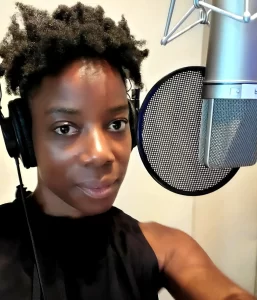
Namakula on one of her voice-over projects.
13. What are your tips for budding actors?
Don’t get involved in the industry to become a millionaire. It can happen, but there are more effective ways to get rich if that’s your goal.
I also don’t believe in the starving artist idea that we should be happy creating, even if it means living on the streets. What you bring to the table has value, and you deserve to be compensated for it.
Be discerning about the work you do, why you’re doing it and who you’re doing it for.
Aim to do projects that fulfil you, make your heart sing and lift your spirit.
That’s for anything. Whether it’s creative or not. Do projects that enrich you and others if that’s your end goal.
14. What’s next for you?
I’ve started working with a new agent on the west coast for TV and film projects. I just finished another poetry narration, which I dedicated to my father.
I also run my own business, Agent 99 Reps, where I produce projects and recruit and offer consulting services, particularly to other artists and aspiring entrepreneurs. Many people have helped me along the way, so I want to give back to others.
Whatever I do, I want to approach things wholeheartedly and with good energy. I’m grateful for where following my passions and inner voice have taken me. I’m deeply inspired by inspiring others.
I hope telling a bit about my journey, ignites and uplifts others out there. Thank you for inviting me to share my story. More to come!
Thank you Namakula. I’m sure your dad is smiling down proudly and tipping his cowboy hat to you.
To find out more about Namakula’s projects, visit her website:
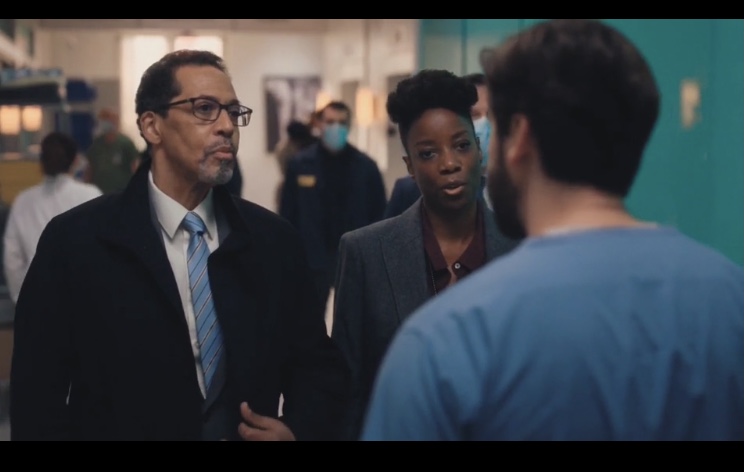
An amazingly talented person.
Thanks Moe and we agree!